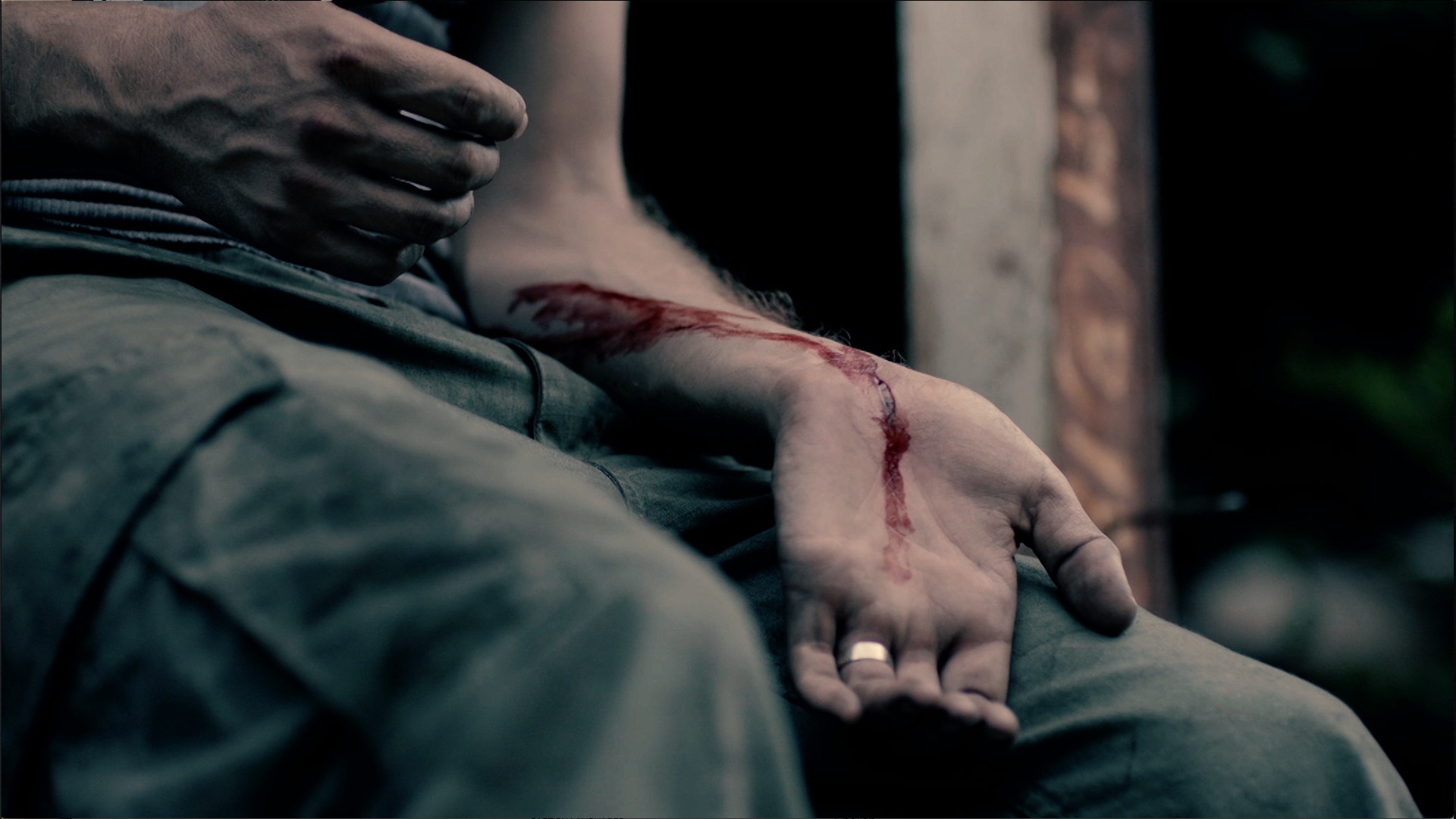Ulrich Baumgarten
I'd been biking around the gorgeous art-installation island of Naoshima, Japan, all morning when I came across a secluded little bathing beach. I couldn't pass up the opportunity to briefly escape the humidity with a dip in the water. After what was easily one of the top five most satisfying ocean swims of my life, I grabbed my shoes and bag of clothes and walked back to the changing stalls to rinse off and dress.
Just before I'd reached the door, a jolt of pain shot up my right leg. I lifted my foot to find a rusty bobby pin stuck about two centimeters into my heel. Without thinking, I plucked it out and vindictively threw it away from me, like this inanimate object had purposefully positioned itself in the sand at just the right angle to find purchase in my flesh. As blood started to seep from the tiny wound, I sighed, resigning myself to a new set of evening plans.
"Welp. Looks like I need a tetanus shot," I informed my travel buddy.
A bus, ferry, taxi, two hospitals, and countless Google Translate-assisted conversations later, I was finally sitting in the office of a surgeon who comprehended the story of my injury and request for a tetanus shot. The doctor informed me that, in Japan, in lieu of shots, tetanus scares like mine were treated with minor surgery, in which the wound is sliced open, cleaned out, and stuffed with gauze dipped in a tetanus immune globulin (antibodies, basically) before being bandaged up. He then said that, were he in my shoes, he'd probably forego treatment and risk the infection, as "a procedure like this is very expensive."
"How expensive?" I pressed, my mind immediately workshopping potential medical emergency GoFundMe headlines.
"Almost $100 US."
Once I'd stopped laughing, I gave the surgeon the green light and he told me to lie face-down on the school nurse's office-style cot in the corner of the room. Without the byzantine American framework of forms, provider calls, and baked-in price-gouging to get in the way, my minor surgery was happening at a dizzying speed.
More from Tonic:
The doctor wheeled his desk chair over to the cot, plunked my foot down in a metal tray, and began sterilizing the wound with iodine. "Don't move," he said and, before I had a chance to grasp that this meant there was to be no shot of anesthesia or numbing agent, I felt his scalpel open me up. I vocalized my pain through gritted teeth but, a few moments later, the worst of it was over.As my surgeon completed the operation, I took stock of my surreal situation. Smooth jazz played over the room's speakers, some nurses had come in from the front desk to giggle at the foreigner who'd somehow wound up in their small-town hospital, and I'm pretty sure the doctor wasn't wearing gloves. My (now larger) wound throbbed as I was wrapped up and sent to the lobby to pay my adorably meager bill, but as I considered the savings that dull ache was affording me, I was glad I could feel it. Though it was one of the more painful hospital experiences of my life, it was simultaneously one of the most enjoyable on account of its simplicity.How did I/we get to the point where not receiving anesthesia for such a treatment comes as a surprise? A wee bit of pain never hurt anyone. Even setting aside the latent toxic masculinity and gender roles lurking in this question, I'm pressed to come up with a good reason that anyone—man, woman, or child—would need chemical numbing for something this minor. It turns out that my American relationship with pain relief may be closer to the exception than the rule. Japan's aversion to anesthesia extends well beyond procedures like the one I'd had. The internet is rife with accounts of painful Japanese dental work for those who care to look. Furthermore, according to a 2012 Japan Times article, "only 10 percent of Japanese women receive anesthesia during natural childbirth, whereas upwards of 90 percent of American women opt for it." It seems that anesthesia is a luxury good America has had a hard time going without. In fact, its usage has increased in some areas where it was once a rarity. Thanks to certain regional insurance providers deciding to cover the costs, the instances of full anesthesia during colonoscopies—something that is not necessary for the vast majority of patients—has been on the rise, climbing from 14 percent in 2003 to 30 percent in 2009.It's not that we're unaware of its dangers, either. The high and lingering risks of general anesthesia are widely reported, and yet Americans remain so addicted to palliatives that anesthesiologist supply is not meeting demand, resulting in a shortage that physician staffing agency Onyx MD claims "is quickly approaching a crisis."There is obviously a time and place for anesthesia, and a legitimate shortage of anesthesiologists would and does needlessly cost lives. We can already see this playing out in the developing world, where some countries have zero anesthesiologists to tend to patients. According to a recent NPR report, in some parts of sub-Saharan Africa, due to a lack of properly trained providers, "people are 1,000 times more likely to die of complications related to anesthesia." But, as wealthy America is still well above the World Federation of Societies of Anaesthesiologists' goal of five anesthesiologists per 100,000 people, perhaps there's still room for Americans to power through some pain. Fortunately, a happy medium between deadly scarcity and over-indulgence may be within reach. While I may have inadvertently stumbled into an anesthesia-free minor surgery, a number of other American patients are now opting to stay awake for much more intensive and grisly procedures, choosing topical numbing injections for surgeries that were once a general-anesthesia foregone conclusion. In a recent New York Times piece on this new breed of conscious patient, an ER doctor named David S. Howes, who's stayed awake through two knee surgeries and, yes, a colonoscopy, perfectly encapsulated this necessary pivot towards the US hardening the fuck up by stating, "If I want sedation, I'll have a beer." (He also admits that awake surgery is not for the faint of heart.) When I changed my bloody foot-wound's bandages the day after my hospital visit, the pain was still there, but manageable. I'd done myself no favors by walking fifteen miles on it since the surgery, but what other choice did I have? I was traveling. Once I'd finished dressing the wound with clean bandages, I dealt with the pain just as Howes would, and had a beer.Read This Next: I Got Surgery to Fix My Man Boobs
Advertisement
More from Tonic:

The doctor wheeled his desk chair over to the cot, plunked my foot down in a metal tray, and began sterilizing the wound with iodine. "Don't move," he said and, before I had a chance to grasp that this meant there was to be no shot of anesthesia or numbing agent, I felt his scalpel open me up. I vocalized my pain through gritted teeth but, a few moments later, the worst of it was over.As my surgeon completed the operation, I took stock of my surreal situation. Smooth jazz played over the room's speakers, some nurses had come in from the front desk to giggle at the foreigner who'd somehow wound up in their small-town hospital, and I'm pretty sure the doctor wasn't wearing gloves. My (now larger) wound throbbed as I was wrapped up and sent to the lobby to pay my adorably meager bill, but as I considered the savings that dull ache was affording me, I was glad I could feel it. Though it was one of the more painful hospital experiences of my life, it was simultaneously one of the most enjoyable on account of its simplicity.How did I/we get to the point where not receiving anesthesia for such a treatment comes as a surprise? A wee bit of pain never hurt anyone. Even setting aside the latent toxic masculinity and gender roles lurking in this question, I'm pressed to come up with a good reason that anyone—man, woman, or child—would need chemical numbing for something this minor. It turns out that my American relationship with pain relief may be closer to the exception than the rule. Japan's aversion to anesthesia extends well beyond procedures like the one I'd had. The internet is rife with accounts of painful Japanese dental work for those who care to look. Furthermore, according to a 2012 Japan Times article, "only 10 percent of Japanese women receive anesthesia during natural childbirth, whereas upwards of 90 percent of American women opt for it." It seems that anesthesia is a luxury good America has had a hard time going without. In fact, its usage has increased in some areas where it was once a rarity. Thanks to certain regional insurance providers deciding to cover the costs, the instances of full anesthesia during colonoscopies—something that is not necessary for the vast majority of patients—has been on the rise, climbing from 14 percent in 2003 to 30 percent in 2009.It's not that we're unaware of its dangers, either. The high and lingering risks of general anesthesia are widely reported, and yet Americans remain so addicted to palliatives that anesthesiologist supply is not meeting demand, resulting in a shortage that physician staffing agency Onyx MD claims "is quickly approaching a crisis."There is obviously a time and place for anesthesia, and a legitimate shortage of anesthesiologists would and does needlessly cost lives. We can already see this playing out in the developing world, where some countries have zero anesthesiologists to tend to patients. According to a recent NPR report, in some parts of sub-Saharan Africa, due to a lack of properly trained providers, "people are 1,000 times more likely to die of complications related to anesthesia." But, as wealthy America is still well above the World Federation of Societies of Anaesthesiologists' goal of five anesthesiologists per 100,000 people, perhaps there's still room for Americans to power through some pain. Fortunately, a happy medium between deadly scarcity and over-indulgence may be within reach. While I may have inadvertently stumbled into an anesthesia-free minor surgery, a number of other American patients are now opting to stay awake for much more intensive and grisly procedures, choosing topical numbing injections for surgeries that were once a general-anesthesia foregone conclusion. In a recent New York Times piece on this new breed of conscious patient, an ER doctor named David S. Howes, who's stayed awake through two knee surgeries and, yes, a colonoscopy, perfectly encapsulated this necessary pivot towards the US hardening the fuck up by stating, "If I want sedation, I'll have a beer." (He also admits that awake surgery is not for the faint of heart.) When I changed my bloody foot-wound's bandages the day after my hospital visit, the pain was still there, but manageable. I'd done myself no favors by walking fifteen miles on it since the surgery, but what other choice did I have? I was traveling. Once I'd finished dressing the wound with clean bandages, I dealt with the pain just as Howes would, and had a beer.Read This Next: I Got Surgery to Fix My Man Boobs
